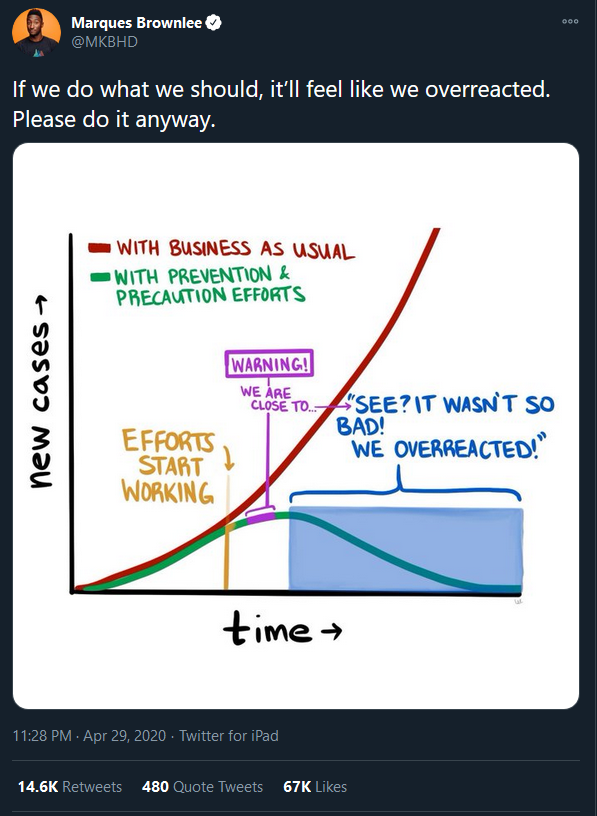
2020 was going to be a “super year for nature”. Multiple global climate and biodiversity conferences were to take place, attended by ambitious policy makers who would chart the course for navigating the climate and biodiversity crises through the new decade. Building on the momentum picked up during the UN Decade on Biodiversity, 2020 got off to an optimistic start.
Then came March 11.
The World Health Organization declared the COVID-19 outbreak a pandemic and the course of 2020 instantly changed. Instead of pushing forward on climate action and biodiversity conservation, the attention of world leaders has been focused on the pandemic, and much-anticipated meetings for the UN Convention on Biological Diversity have been postponed. While this was a necessary shift, the pandemic has also offered valuable lessons for tackling climate change and the biodiversity crisis.
1. Listen to Science
From physical distancing to mask use to vaccine development, science has played a critical role in developing public policy to curb the spread of COVID-19. There has been a stark contrast in outcomes in countries where science has been central to decision making, like Taiwan and New Zealand, and where scientists have been ignored or even outright dismissed, like the United States. We’ve also seen what happens when governments start to get a bit lax on prioritizing science in their decision making – their constituents pay the price with soaring infection rates and deaths.
The climate crisis requires a similar science-based approach. The good news is that scientists have been telling us for decades what we need to do to combat climate change. The bad news is that scientists have been telling us for decades what we need to do to combat climate change. The consensus is clear around what is needed – renewable energy sources need to be developed, fossil fuels need to be left in the ground and at least half of the planet needs to be set aside for nature – but the best science in the world doesn’t help unless it is acted upon, as we have seen in the case of the COVID-19 response.
2. Equity Based Public Policy
Throughout the pandemic, governments have pleaded with us to all do our part, telling us that everyone must take responsibility in curbing the spread of the disease. But the cruel reality of the pandemic is that not all communities have been impacted equally. Working on the front lines of the economy (often with inadequate protection), relying on public transit, and living in high density neighbourhoods has meant that low income communities have been disproportionately affected by COVID-19, especially Black, Indigenous and other racialized communities who face additional barriers in a healthcare system rife with systemic inequities.
The pandemic has required all of us to quickly shift behaviours seemingly overnight. People have been asked to work from home, to reduce the number of trips they take outside their home and to minimize their contacts, but not everyone is in a position to do so, and a lack of strong social safety nets has left some with the choice between having a roof over their head or their health and safety. Climate change will force similar societal level changes, and the pandemic has proved they are possible, but only if no one is left behind and all communities are included in decision making. Like the pandemic, vulnerable communities, especially those who contribute the least to the problem, bear the brunt of the impacts of climate change. In neither case is there a one size fits all solution, and if we truly want to address the problems caused by the pandemic and climate change, equity based programs and policies will be essential such as a wealth tax, housing as a human right, paid sick leave and Indigenous control of the land.
3. We Can’t Let Our Guard Down
Getting COVID-19 under control will require an all-out effort on multiple fronts. In some jurisdictions, it started to feel like the pandemic was under control and people began to let their guard down, foregoing masks to just pop into a store “for a minute” or expanding their social circle to attend a large gathering. Complacency allowed the virus to regain a foothold in these communities, and now many places are experiencing worse outbreaks than in the spring when everyone was on their A-game. Because of this, it’s going to take even greater efforts to get the virus back under control this time around.
The fight against climate change will be similar. We have spent years, decades even, in the “forgetting a mask and going to a party with 50 people” stage of the fight against climate change. The only way forward towards a better tomorrow is an all-out effort where climate change is factored into every decision. Nearly 2,000 jurisdictions at every level of government have declared a climate emergency, which is important, but if not backed up by considerable radical action, it amounts to empty words, marching us closer to climate calamity.
4. Our Systems Have Limits
The pandemic has been fueled by a virus that spreads exponentially. Likewise, the climate crisis has been fueled by an economic system obsessed with growth. In both cases, the systems designed to cope with the negative effects have limited capacities. Healthcare systems around the world have become strained by rising infection rates, and in some cases, they have reached a breaking point. Similarly, as droughts, hurricanes, wildfires and other extreme events increase with climate change, our ability to manage and respond to them all wanes, and we could soon reach a point where there are simply too many fires to put out.
A key lesson of the pandemic has been that we must act in a manner that looks disproportionate to what the current reality is. Remember back in April when we all “stayed the blazes home” even though case numbers were relatively low? Remember when the goal was to flatten the curve so that the worst thing that could happen was that people would say we overreacted? Throughout the pandemic we have constantly been told that mitigation will be less costly than delaying action and having to deal with the problem later. The same is true for climate change. The longer we wait to act, the harder it will be to solve the problems.

Credit: @MKBHD on Twitter
2020 has certainly been a challenging year, but the realities of the climate and biodiversity crises means that things are just getting started. While the “super year for nature” had to be put on hold, we have learned some valuable lessons for how to tackle the next wave of global challenges.
Cover photo: © Ulet Ifansasti / Greenpeace on Flickr, CC BY-NC-ND 2.0










